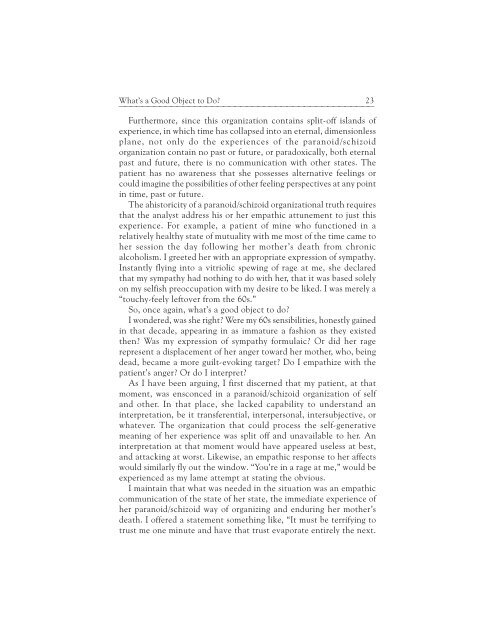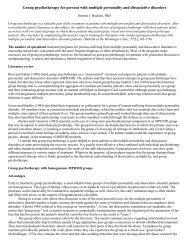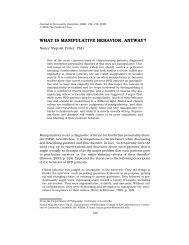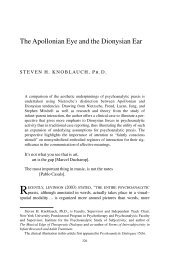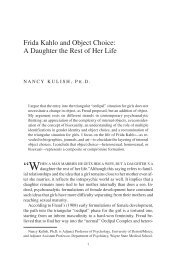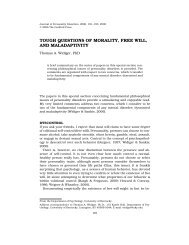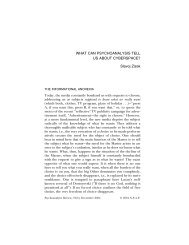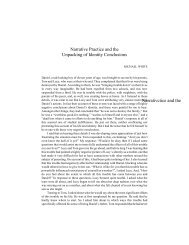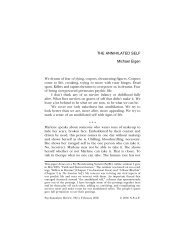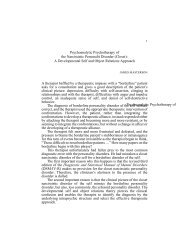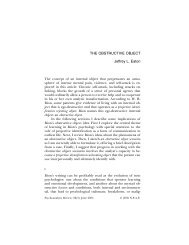What's a Good Object to Do? - PsyBC
What's a Good Object to Do? - PsyBC
What's a Good Object to Do? - PsyBC
Create successful ePaper yourself
Turn your PDF publications into a flip-book with our unique Google optimized e-Paper software.
What’s a <strong>Good</strong> <strong>Object</strong> <strong>to</strong> <strong>Do</strong> 23<br />
⎯⎯⎯⎯⎯⎯⎯⎯⎯⎯⎯⎯⎯⎯⎯⎯⎯⎯⎯⎯⎯⎯⎯⎯⎯⎯⎯⎯⎯⎯⎯⎯⎯⎯⎯⎯⎯⎯⎯⎯⎯⎯⎯⎯<br />
Furthermore, since this organization contains split-off islands of<br />
experience, in which time has collapsed in<strong>to</strong> an eternal, dimensionless<br />
plane, not only do the experiences of the paranoid/schizoid<br />
organization contain no past or future, or paradoxically, both eternal<br />
past and future, there is no communication with other states. The<br />
patient has no awareness that she possesses alternative feelings or<br />
could imagine the possibilities of other feeling perspectives at any point<br />
in time, past or future.<br />
The ahis<strong>to</strong>ricity of a paranoid/schizoid organizational truth requires<br />
that the analyst address his or her empathic attunement <strong>to</strong> just this<br />
experience. For example, a patient of mine who functioned in a<br />
relatively healthy state of mutuality with me most of the time came <strong>to</strong><br />
her session the day following her mother’s death from chronic<br />
alcoholism. I greeted her with an appropriate expression of sympathy.<br />
Instantly flying in<strong>to</strong> a vitriolic spewing of rage at me, she declared<br />
that my sympathy had nothing <strong>to</strong> do with her, that it was based solely<br />
on my selfish preoccupation with my desire <strong>to</strong> be liked. I was merely a<br />
“<strong>to</strong>uchy-feely lef<strong>to</strong>ver from the 60s.”<br />
So, once again, what’s a good object <strong>to</strong> do<br />
I wondered, was she right Were my 60s sensibilities, honestly gained<br />
in that decade, appearing in as immature a fashion as they existed<br />
then Was my expression of sympathy formulaic Or did her rage<br />
represent a displacement of her anger <strong>to</strong>ward her mother, who, being<br />
dead, became a more guilt-evoking target <strong>Do</strong> I empathize with the<br />
patient’s anger Or do I interpret<br />
As I have been arguing, I first discerned that my patient, at that<br />
moment, was ensconced in a paranoid/schizoid organization of self<br />
and other. In that place, she lacked capability <strong>to</strong> understand an<br />
interpretation, be it transferential, interpersonal, intersubjective, or<br />
whatever. The organization that could process the self-generative<br />
meaning of her experience was split off and unavailable <strong>to</strong> her. An<br />
interpretation at that moment would have appeared useless at best,<br />
and attacking at worst. Likewise, an empathic response <strong>to</strong> her affects<br />
would similarly fly out the window. “You’re in a rage at me,” would be<br />
experienced as my lame attempt at stating the obvious.<br />
I maintain that what was needed in the situation was an empathic<br />
communication of the state of her state, the immediate experience of<br />
her paranoid/schizoid way of organizing and enduring her mother’s<br />
death. I offered a statement something like, “It must be terrifying <strong>to</strong><br />
trust me one minute and have that trust evaporate entirely the next.


